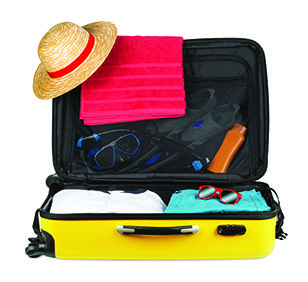Prudent Travel Planning

Planning for safe travel involves much more than securing your plane tickets and hotel reservations. Prudent planning can eliminate or mitigate many hazards associated with travel — even to remote places.
Before you leave home or even book your trip, be sure to take the following steps.
Research Your Destination
All travelers should learn some basic facts about their destination. Knowing the typical weather for the time of year you’ll be visiting your destination will allow you to pack appropriate clothing to keep you safe and comfortable. Knowing the extent of local health precautions will help you determine what is safe to eat and drink and what items to avoid. This planning is an essential first step in ensuring a great trip, whether to a favorite site or
new location.
Check Your Health
How is your health? Have there been any changes in your health status since your last trip? Are you seeing a physician before your trip to treat even a minor health issue? A “simple” hernia, for example, could become entrapped and require emergency surgery where no such service exists. It would be prudent to get your doctor’s approval for an upcoming trip and recommendations for maintaining good health while you are away. Consider any activity limitations that would restrict the amount of walking, climbing or bicycling you do on your journey. Your abilities should match the type of lodging you choose and the means of transportation you will use during your trip. (See also Medical Fitness to Travel.)
Know Your Medications
Daily medication that enhances your health can be easy to take for granted when it is readily available. Do you know your medications well, including their dosage and possible side effects? Some medications, for example, can make you drowsy, inattentive or more susceptible to acute mountain sickness. Other medications can cause hypotension (low blood pressure), muscle pain, photosensitivity (an abnormal reaction to the sun), headache or other side effects. Some malaria prophylactics such as Mefloquine are contraindicated for diving. Medication side effects can range from annoying to severe, and some may increase your risk of injury.
If you must start a new medication before a trip, discuss with your physician when it will be safe for you to travel. Some countries require you to carry an original prescription bearing your name and your physician’s signature for certain medicines.
Pack Well
Ensure you have all appropriate health- and safety-related necessities, but otherwise travel as light as possible. Hauling around heavy luggage may hurt your shoulders or back and spoil your trip. If you are flying, make sure your carry-on luggage contains essentials such as your passport and other travel documents, medications, valuables and anything else you need to travel in comfort. Try to limit your carry-on luggage in number, size and weight so you can move expeditiously through airports and easily lift your bag into the overhead compartment. If possible, keep the space under the seat in front of you empty so you can stretch your legs.
If you must walk for a long distance, try not to carry more than 10 percent of your weight. Put a copy of your travel documents in each piece of luggage so you’ll still have critical information in case any baggage is delayed or lost.
Have a Plan for Illness or Injury
Consider purchasing travel health and medical evacuation insurance. Travelers are often responsible for hospital fees and other medical expenses they incur while abroad. Check to see if your health insurance plan will cover your medical needs abroad. If you do have coverage, be prepared to pay out of pocket at the time you receive any medical services while you are traveling. Be sure to purchase additional coverage for your trip if your health insurance won’t cover you while you are traveling. Remember that the DAN membership benefit is for medical evacuation to a location where you can receive the appropriate care if you are seriously ill or injured while traveling.
Know Common Illnesses
Before you leave for a trip, especially if you are going to a remote area or a developing country, make sure you know the signs and symptoms of common illnesses you might encounter there so you can recognize them and quickly take action if needed. This guide covers some conditions you should know.
Share Your Travel Plans
Be sure that at least one person back home has details of your itinerary, a copy of your passport and visas, and information for how to reach you and where you’d likely be taken in case of a medical emergency. Make sure you declare an emergency contact other than your spouse or travel companion.

Be S-A-F-E on Every Trip
SEEK consultation with a travel medicine specialist at least two months before travel.
ASK about vaccines that might be recommended for specific destinations.
FIRST AID kit should contain regular and special medication for the trip; be sure to pack it in your carry-on luggage.
EVACUATION and travel insurance are necessary to cover health emergencies while abroad.


Remember that the DAN membership benefit is for medical evacuation to a location where you can receive the appropriate care if you are seriously ill or injured while traveling.


For your first dive
after a period of inactivity:
Do not dive alone.
Consider diving with a divemaster or instructor.
Dive at a familiar site with the following conditions:
— shallow
— minimal or no currents
— no major hazards
— not remote
Practice the following skills and others in confined water before you dive in open water:
• predive checks
• buoyancy
• proper weighting
• mask clearing
• mask removal and replacement
• regulator recovery and clearing
• shared-air ascent
• emergency swimming ascent or controlled emergency swimming ascent (depending on what your training agency teaches)
DIVERS:
Do You Have the Appropriate Training…
and Experience for Your Destination?
Before booking a trip, become familiar with the dive conditions at your destination, and make an honest evaluation of your fitness to dive in those conditions. Keep in mind that conditions can vary widely by season.
Skills acquired through basic open-water training may be enough for leisurely diving in calm, shallow water, but many of the world’s most exciting dive sites are rife with challenges, both at the surface and underwater. Entering through the surf, coping with currents and participating in drift diving, low-visibility conditions or night diving and other challenging conditions may warrant special skills, equipment, physical capabilities or additional training.
While people often spontaneously handle many of life’s first-time experiences, certified divers should prepare for their first-time experiences in certain dive conditions by either taking organized training or asking for help from divers experienced in those conditions. When you research your dive destination, make sure you understand local challenges that may exceed your previous experience and take the time to prepare for them.
When you arrive at your destination, ask the dive operator to properly brief you about the dive sites. This orientation could be just what you need, but it is also a good idea to do your own research. Find out how prepared your dive operator is to provide first aid and oxygen, ask them about their emergency action plan, and update your emergency action plan accordingly.
When you make your emergency action plan, incorporate what medical and rescue services may be available at your destination, consider conditions on board your dive vessel and the remoteness of the locations, and bring copies of your travel documents with you. For more information about creating an emergency action plan, visit DAN.org/safety-prevention/diver-safety/divers-blog/how-to-create-an-effective-emergency-action-plan-eap.
Diving skills will deteriorate if not practiced. If you have not been diving in a few months, practice fundamental skills in confined or shallow water before your open-water dives. If you have not been diving in a year or more, take a refresher course with a dive instructor. DAN highly recommends both the classroom portion (which includes basic dive physics and physiology as well as dive planning and execution using dive tables and computers) and the in-water skills portion. If you take your refresher course at home before your trip, you will have more time to enjoy your destination dives, plus you can ensure your equipment is functioning properly before you haul it on your travels.
DAN Customer Service
Mon–Fri, 8:30 a.m. – 5 p.m. ET
+1 (919) 684-2948
+1 (800) 446-2671
Fax: +1 (919) 490-6630
24/7 Emergency Hotline
In event of a dive accident or injury, call local EMS first, then call DAN.
24/7 Emergency Hotline:
+1 (919) 684-9111
(Collect calls accepted)
DAN must arrange transportation for covered emergency medical evacuation fees to be paid.
Medical Information Line
Get answers to your nonemergency health and diving questions.
Mon–Fri, 8:30 a.m. – 5 p.m. ET
+1 (919) 684-2948, Option 4
Online: Ask A Medic
(Allow 24-48 hours for a response.)